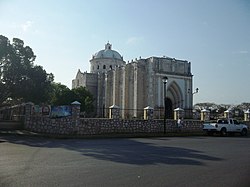Umán Municipality
| Umán | |
|---|---|
| Municipality | |

Principal Church of Umán, Yucatán
|
|
 Region 2 Noroeste #101 |
|
| Location of the Municipality in Mexico | |
| Coordinates: 20°53′N 89°45′W / 20.883°N 89.750°WCoordinates: 20°53′N 89°45′W / 20.883°N 89.750°W | |
| Country |
|
| State |
|
| Mexico Ind. | 1821 |
| Yucatán Est. | 1824 |
| Municipality Est | 1921 |
| Government | |
| • Type |
|
| • Municipal President | Jesús Adrian Quintal Ic |
| Area | |
| • Total | 234.30 km2 (90.46 sq mi) |
| Elevation | 7 m (23 ft) |
| Population (2010) | |
| • Total | 50,993 |
| • Density | 220/km2 (560/sq mi) |
| • Demonym | Umanense |
| Time zone | Central Standard Time (UTC-6) |
| • Summer (DST) | Central Daylight Time (UTC-5) |
| Postal Code | 97390 |
| Area code(s) | 988 |
| INEGI Code | 101 |
| Major Airport | Merida (Manuel Crescencio Rejón) International Airport |
| IATA Code | MID |
| ICAO Code | MMMD |
| Website | Official Website |
| Municipalities of Yucatán | |
Umán Municipality (In the Yucatec Maya Language: “purchase”) is one of the 106 municipalities in the Mexican state of Yucatán containing (234.30 km2) of land and located roughly 15 km southwest of the city of Mérida.
There is no accurate data on when the town was founded, though it existed before the conquest and in antiquity belonged to the chieftainship of Ah Canul. At colonization, Umán became part of the encomienda system with Francisco Hernández recorded as one of the earliest encomenderos.
Yucatán declared its independence from the Spanish Crown in 1821 and in 1825, the area was assigned to the Lower Camino Real with its headquarters in Hunucma Municipality. In 1921, was designated as its own municipality.
The municipal president is elected for a three-year term. The town council has nine councilpersons, who serve as Secretary and councilors of heritage and sports, policing, education and health, public works, potable water, rural development and social management, roads and markets, nomenclature and recruiting, ecology, public monuments.
The head of the municipality is Umán, Yucatán. There are 87 populated areas of the municipality. The most notable include Bolón, Dzibikak, Dzununcán, Itzincab, Oxcum, Oxholón, Poxilá, San Antonio Mulix, Tebec, Xtepen, and Yaxcopoil. The significant populations are shown below:
Every year from 13 to 15 September the town holds a celebration for the Christ of Love.
...
Wikipedia

